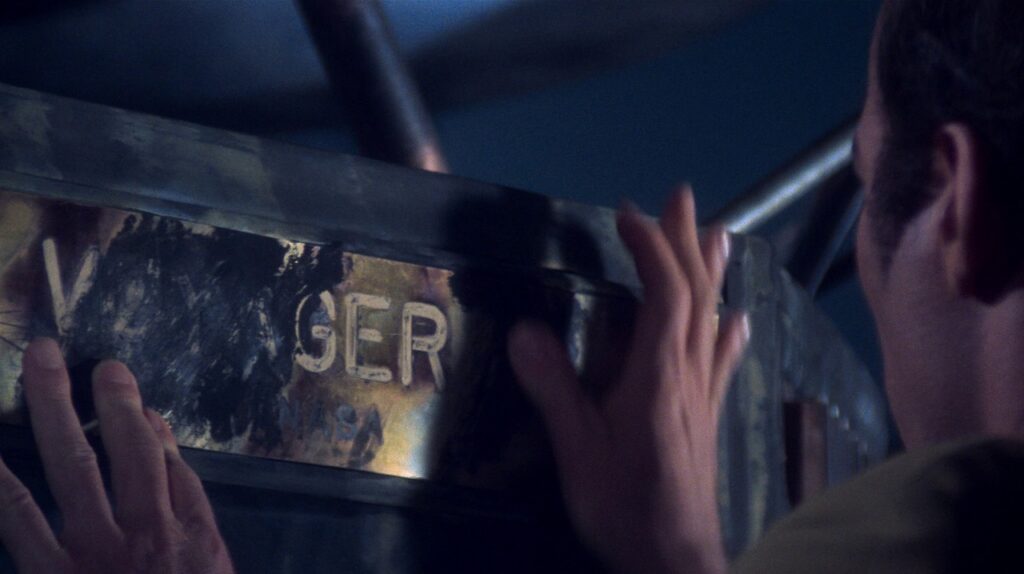The Martian: How NASA Soars – and Stumbles – Simultaneously

Can Hollywood save NASA?, Washington Post
“NASA is having something of a moment. “The Martian” debuts this week to huge expectations: starring Matt Damon and directed by Ridley Scott, the $100-million-plus film highlights not only the ingenuity and pluck of those who would go to the stars, but also the bureaucratic stumbling blocks facing our spacefarers at home.”
The Martian is a great movie, but it sends the wrong message about our happy little journey to Mars, Houston Chronicle
“What I’m concerned about is the way in which a mission to Mars is portrayed in the book and film. It looks a lot like an Apollo mission to Mars, and in 2015 that’s a problem. From outward appearances, almost all of the hardware is NASA hardware. All of the important decisions are made by NASA people. There isn’t a whiff of commercial space in the film. Not a SpaceX, nor even a Boeing. It’s all NASA. (Not that NASA isn’t great. It is.)”
 Keith’s note: One on hand “The Martian” shows how NASA people can do almost anything when they put their minds to it. On the other hand it shows that even a future NASA is plagued by seemingly inescapable bureaucratic inertia. This strange duality was inherent in “Apollo 13” set nearly half a century ago – and seems to be what people expect will exist at NASA decades from now. Its almost as if one person at NASA can’t excel at something without having someone down the hall doing something stupid. The time span between “Apollo 13” and “The Martian” is some 60 or so years. I’m not sure what to think about an agency that still can’t find a better way to do things after 60 years. Its as if no one can imagine a future NASA different than the NASA of today – or yesterday.
Keith’s note: One on hand “The Martian” shows how NASA people can do almost anything when they put their minds to it. On the other hand it shows that even a future NASA is plagued by seemingly inescapable bureaucratic inertia. This strange duality was inherent in “Apollo 13” set nearly half a century ago – and seems to be what people expect will exist at NASA decades from now. Its almost as if one person at NASA can’t excel at something without having someone down the hall doing something stupid. The time span between “Apollo 13” and “The Martian” is some 60 or so years. I’m not sure what to think about an agency that still can’t find a better way to do things after 60 years. Its as if no one can imagine a future NASA different than the NASA of today – or yesterday.
40-50-60 years and NASA can’t fix itself? I am not sure it will be around when this movie is supposed to happen. Is this any way to explore the solar system? No … after 19.5 years of ranting online about this, I still don’t have an answer.
Do any of you?









I read the above cited article with annoyance: why must *all* science fiction be a mirror of existing social issues and microagression grievances?
The case can be made that the best SF does exactly that. SF simply extrapolates into the future, wondering what people will do in different circumstances and with different tools.
It can also be prescriptive, and perhaps that’s your objection? “1984” and “Fahrenheit 451” come to mind, among the classics.
It’s a movie, though! I mean, it was written with standard movie conflict in mind, informed by historical and “understood” aspects of the space program. Many of these issues are related to human nature, not any inherent organizational flaw that’s unique to NASA. NASA isn’t that unique in terms of the issues it faces as a large technical organization and one that is bound by federal and political forces! Will some of NASA’s current issues still be at play in the future? Well, will human beings still be part of NASA in the future? If so, the answer is yes!
On another note, there is a great film that was done in the UK I believe, The Challenger Disaster with William Hurt – it’s fact-based but also presented as a compelling portrait of Richard Feynman.
Hey, Keith…
A comment to the question of how NASA’s behaviors could be the same 60 years after Apollo 13… I believe it is strictly culture and heros — not heroes in the sense of astronauts, but rather “heroes” in the sense of managers who teach one the trade and set an example that one wishes to follow. The culture of NASA’s human space flight program was laid down in the 1960s. The individuals have changed, but the folks in the control room today, learned from those who learned from those who learned from…etc.
Cultures are extremely hard to change; usually it takes a transformational event or leader who somehow establishes a completely new set of “norms” — a Norman Invasion, a Christ, a Napoleon or a Lincoln. It need not be a “hit” against the cultural legacy of an organization to make a significant change; however, for those inside the culture, it can certainly feel like unacceptable criticism of past “heroes”… This is just human nature; it is not a peculiar failing of NASA. (Those within a culture often cannot imagine how something fundamental could change — those who have such “crazy” ideas don’t last in the culture, but are expelled…)
As a result, It can be much easier for an outsider group — a space company in Hawthorne comes to mind — to make what seems like “radical” changes (at least until they become the new norms).
Best…
40-50-60 years and NASA can’t fix itself? Not sure it will be around when this movie is supposed to happen.
It’ll be around. We haven’t had a government since Reagan (briefly) that wanted to impose agency-devastating cutbacks on NASA, and it’s popular enough to keep going (plus the political and economic heft of its various centers).
Just curious – what does a “fixed” NASA look like?
A fixed NASA looks a lot like NACA. But to get to that point will probably require adoption of Jim Bennett’s Space Guard idea.
It’s not the culture of Mission Control that’s the problem. I would submit that as folks move up and out and get out into the bureaucratic rigamarole that they become separated from that culture. There lies the problem.
And we can also get into a discussion about what happens when we get an administration change in DC…and the desired culture of the person sitting in the Oval Office, and the political baggage that they bring.
Man, that image in the link just drives home how colossal Hermes is (and unfortunately how unlikely it is to ever get built).
Honestly, no. There’s just not really any good replacement for NASA unless one of the commercial space folks really does show us a cheaper way to do things, and that means NASA isn’t going to face a lot of pressure to do better unless a President and influential Congressfolks take a strong personal interest in pressuring it to be so.
I mean, don’t get me wrong. They do a lot that’s good. But still . . .
Is that really how NASA operates? As an outsider, how accurate is the depiction of NASA?
Or is the deprecation of NASA more a reflection of the anti-governemtal sentiment sprinkled by some on society like soot in the industrial age?
NASA making good on their promise to take me to Mars!
Landing date October 2 1915
That’s all folks!
Correction
Showing at 8 tonight!!!
I’m going to Mars!!!
NASA space fantasy
Keith,
Do you or anyone know if today’s Mars Exploration Panel at 11am at Langley is being streamed or webcast? If so, what is the link?
http://www.nasa.gov/press-r…
John Mankins wrote: “heroes” in the sense of managers who teach one the trade and set an example that one wishes to follow;
I think John has hit on the problem. When I first came to NASA JSC, going on 40 years ago, at the tail ends of Apollo and Skylab and as Shuttle was just starting, I knew the managers by their roles, experiences and achievements. I have seen, as these individuals have left, retired and/or died, that they have been replaced by people who seem to have no particular experience. This makes some sense as it has been decades since NASA has developed a manned spacecraft. When I look in the International Space Station Program meetings I attend, mainly I see people who have experience in attending meetings. Almost no one has ever designed or developed anything. In fact the few people I know who have designed or developed things are rarely in lead or management positions.
I’ve also seen where specific cliques, notably astronauts and flight directors, have been put in charge of almost everything. In the Apollo or Shuttle days we had a couple astronauts in management and leadership-but offering their opinions on things pertinent to astronauts; same thing with flight directors-they were in management positions in which they had a role in mission operations. Take a look at the beginning of Constellation, with a Flight Director who had never managed anything, named to be the top program manager, and an ISS Russian coordinator named to lead the Orion vehicle design. Is it any wonder that the Orion capsule had such poorly defined requirements or that it has taken a decade to get to a preliminary design stage? (not to mention it really is not design for the function it is intended to be used for)
In another current post on NW, Wayne Hale laments that the lengthy list of specifications is going to kill the commercial crew effort. Why this lengthy list of specs? Maybe because the NASA people who wrote the program requirements had no actual experience in developing any space hardware, and they did not know which specs to select, so they just included them all?
I should also note that it is not because more experienced and more qualified people were not available in these instances of program management, vehicle design, or spec writing. There were people with experience in Shuttle, Spacehab (commercial), Mir systems development, and with DOD programs, but the NASA management went with people they “knew” despite their lack of experience. You can look all the way to the top of the program, the AA for manned spaceflight, and he has little more experience, and so how can he provide the guidance for others to “learn the trade”. In fact he appears to have been responsible for naming a large number of his contemporaries, all from his old organization, payload operations, to leading positions. I don’t think they’ve worked out too well.
The mission ops directorate has the right idea-they require people to be certified and as they get certified their careers progress and they move from document writer to flight controller to flight director. The other technical/engineering disciplines do not have this and so we wound up in a situation where virtually anyone with a degree can be selected for almost any position.
Now, especially after 3 decades of ISS, you have the big bureaucracy in which the main experience base is in meeting attendance. And the people without the experience in the top positions are fearful of the people who actually have any education and experience. This is a corrupt bureaucracy.
Good luck. Mars? Maybe next century.
It’s my impression that no bureaucracy can do excellence except under highly unusual conditions. Early NASA was one such because of its timing, the immediate past personal experiences of its people (WW2, Korean War), it was newly created, and the geo-political setting in which it was created.
To expect a now-mature bureaucracy — whatever its mission — to behave other than according to Pournelle’s Iron Law is unrealistic. Here and there the Law may be circumvented, but those situations are almost unique.
This is by no means an argument original with me, but one that I think is compellingly persuasive. It’s just how humans behave in large organizations.
Tomorrow land
Why have I always believed we could live in Space?
Because Von Braun and Walt Disney Brain washed me.
Before I was old enough to remember Dr. Wernher Von Braun made his case to almost every American that owned a TV set.
His evil plan worked:-)
We believed.
The othe day I met a man from Ukraine that pointed to the TV and said, don’t listen to that, it is a brain washing machine, follow the money.
NASA seems to believe that a movie could convince the masses to spend more money on NASA.
Why?
Because it happened before.
https://www.google.com/sear…
http://www.mouseplanet.com/…
“There were a LOT more experts at NASA back in the late 1950’s than in industry”
My point, or one of them, was that 40 years ago, many-most -of the people I saw working at NASA had an area of expertise. I no longer see that.
It appears that the more experience and longevity you have in a given area, the less likely to have been put into a position of authority. Most of the people in leadership positions have zero expertise. As one of those with a lot of successful experience, when I look at my management, all the way from the lowest branch level up to the AA, I really have no respect for them, because I cannot point to anything they have accomplished.
I would suggest that some space advocates develop a set of reference missions using SAAs, Falcon Heavies, clustered ion propulsion, and inflatable habs to describe the development of the moon, cis-lunar transportation, a Mars flyby mission, Phobos-Deimos (PhD) mission, and Mars surface missions. SICSA has already done a good job with the PhD mission: http://youtu.be/SUcK8iEr3j8
Then, with every news report about how NASA wants to do something the old-school way, we keep comparing and hammering it with the set of reference missions.
Write a few movie scripts in those settings too.
I have tried to pitch the lunar development setting to two novelist and a Hollywood screenwriter without success yet. I doubt that I could do it myself.
Musk has said that he thought the Martian sounded kind of negative, and that he thought that A mars movie should be more like a wild west shoot then up or something.
Imagine that there is life in them thar hills on Mars and two companies are racing for the medical riches that the samples might bring.
Imagine if Bigelows main customers for moon Habs end up being the Chinese 🙂
For Blue Orion not to compete with ULAs Vulcan, they may need to build a larger rocket that competes directly with SpaceXs big Raptor rocket. SpaceX and Blue in a battle to build Control the inner solar highway.
SPACE WARS 🙂
Not far far away
What if Musk world satellite system does get taken over by AI and the lunatics and the Martians have to save earth?
Maybe you should try talking to SpaceX?
Anybody working on cluster Ion propulsion today??
Yeah, just Goigle it.
To be fair, book and movie writing and publishing takes time. Commercial space has come up kind of fast and most folks are still in denial that on their current plan and timeline NASA astronauts will not be the first to get Mars dust on their boots. Besides, the conflict in this film wouldn’t have been quite so intense if he/they could be rescued by Mars One or SpaceX colonists. 😉
Actually…I wonder if South Park will do something with that. Are you listening Trey Parker? Matt Stone? Brian Graden? Anybody?
There is a fix Keith, it is called free market capitalism where you do not have people like Senators Shelby and Nelson telling you (NASA) what to do and how to spend your money. There are endless examples of this.
I also totally realize that some, minimal, regulation will be needed and that “right now” we do need NASA. We just don’t need congress saddling NASA projects with congressional <censored>.
There could be a great synergy between NASA and private enterprise. But, Congress has become both the hero and the villain in the absence of a strong leader.
Unfortunately the members of Congress are the people we elect. We can’t expect different decisions unless we support different candidates.
You really think which candidate we elect makes much difference?
Both sides in Washington are targeting Warren now because she is exposing them for rigging the market.
The game is ringed folks
Riiiiggghhtttt! The Church of the Free Market! Government lets us do lots of beneficial things that the ‘free market’ wouldn’t even attempt, mostly because the payoff is very far down the road. Space exploration is on that list.
There’s a payoff in space, to be sure, but it is not in deep gravity wells. The $$$ are in asteroids, in situ mining and manufacturing. And those tasks are so far over the horizon that only a public program can provide the saddle stirrups.
And I would also point out that, like it or not, Congress is elected by your fellow citizens. The fact that you (and I) disagree with what they do means agitating for congressional change, or convincing fellow citizens that our way is the best way.
You know. Freedom.
Huh? What?
After my brief visit to Mars I decided it was important to appreciate some food! 🙂
Somehow I don’t think NASA is stupid enough to expect they can defeat
the certain exponential decay in it’s budget relative to other
agencies . . . the data speaks for itself (see chart below) :